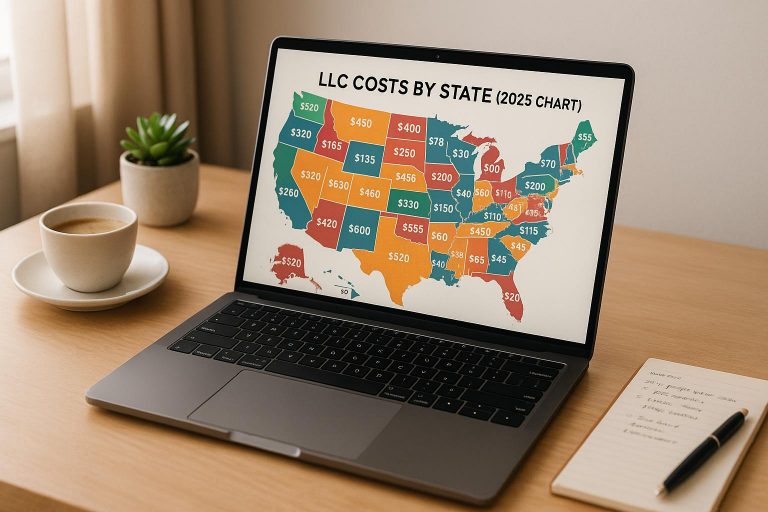Forming an LLC in 2025? Here’s what you need to know:
- Top States: Delaware, Wyoming, Nevada, New Mexico, Texas, and Florida are the leading options for LLC formation.
- Key Factors: Costs (filing fees, annual fees), tax benefits, privacy protections, and compliance requirements vary by state.
- Quick Picks:
- Best for Privacy: Wyoming
- Best for Low Costs: New Mexico
- Best for Legal Support: Delaware
- Business-Friendly: Texas and Florida
Quick Comparison
| State | Filing Fee | Annual Fee | Privacy Level | Tax Benefits | Best For |
|---|---|---|---|---|---|
| Delaware | $110 | $300 | High | No state income tax for out-of-state LLCs | Legal support and flexibility |
| Wyoming | $100 | $60 | Very High | No corporate or franchise taxes | Privacy-focused businesses |
| Nevada | $425 | $350 | High | No personal or corporate income tax | Digital businesses |
| New Mexico | $50 | $0 | High | No franchise tax or annual fees | Low-cost LLCs |
| Texas | $300 | $0* | Moderate | No personal income tax (franchise tax applies to high revenues) | Large business network |
| Florida | $125 | $138.75 | Moderate | No personal income tax | Tourism, real estate, and trade |
*Texas franchise tax applies only to revenues over $1.23 million.
Each state offers unique benefits depending on your business type and priorities. For privacy, go with Wyoming. For low costs, choose New Mexico. Delaware is ideal for legal support, while Texas and Florida cater to growth-focused businesses.
Read on for a detailed breakdown of costs, taxes, and compliance for each state.
1. Delaware
Delaware remains a top choice for forming an LLC in 2025, thanks to its reasonable fees, strong privacy features, and well-established business laws. The state’s efficient formation process and specialized business court system have made it home to over 1.5 million businesses. Notably, 80% of Fortune 500 companies are incorporated in Delaware.
Formation Costs and Annual Fees
Setting up an LLC in Delaware involves an initial filing fee of $110. Additionally, there’s a flat annual franchise tax of $300, due by June 1. First-year costs typically range between $510 and $710, excluding optional services like a $75 name reservation, which secures a name for 120 days.
| Fee Type | Amount | Due Date |
|---|---|---|
| Formation Filing | $110 | One-time |
| Annual Franchise Tax | $300 | June 1 |
| Registered Agent (est.) | $100–$300 | Annually |
| Name Reservation (Optional) | $75 | 120-day hold |
These costs are offset by Delaware’s favorable tax policies.
Tax Benefits
Delaware’s tax structure is especially advantageous for businesses operating outside the state. LLCs conducting business elsewhere aren’t subject to state income tax and benefit from pass-through taxation. Plus, the absence of a state sales tax helps lower the overall tax burden.
Privacy Features
One of Delaware’s standout features is its privacy protection. The state doesn’t require public disclosure of member names, keeping ownership details confidential.
Legal Advantages
Delaware’s Court of Chancery is dedicated to handling business disputes and is backed by over 200 years of case law. The American Bar Association highlights the court’s efficiency in resolving disputes as a key reason for its legal appeal.
Compliance Details
Delaware simplifies compliance by not requiring annual reports or operating agreements.
Tax Savings Example
Consider a software company with $2 million in revenue that operates remotely. In Delaware, it wouldn’t owe state income tax, saving approximately $174,000 annually compared to states with corporate tax rates around 8.7%. Even after the $300 franchise tax, the savings are substantial.
Delaware’s introduction of the Personal Data Privacy Act (HB154) in 2025 further strengthens its position by enhancing consumer data protections, making it an attractive option for privacy-focused entrepreneurs.
2. Wyoming
Wyoming is known for its low costs, privacy protections, and tax perks. Forbes even named it the "Best State for Asset Protection" for 2024–2025.
Formation Costs and Annual Fees
Starting a business in Wyoming is budget-friendly. The state charges a $100 filing fee for Articles of Organization and a $60 annual report fee, which is due by February 1.
| Fee Type | Amount | Due Date |
|---|---|---|
| Formation Filing | $100 | One-time |
| Annual Report | $60 | February 1 |
| Registered Agent | $50–$200 | Annually |
| Expedited Processing (Optional) | $50 | One-time |
Tax Benefits
Wyoming doesn’t impose corporate, personal, or franchise taxes. It does have a 4% sales tax on taxable goods and services. To put this into perspective, a business earning $500,000 annually could save over $44,200 in state taxes compared to California, which charges an $800 franchise tax and an 8.84% corporate tax. These savings are paired with Wyoming’s strong privacy measures.
Privacy Features
Wyoming prioritizes business owner privacy with anonymous ownership structures. The 2023 Data Privacy Act, effective in 2025, further limits third-party data sharing. Attorney Michele Stuart highlights this advantage:
"Wyoming combines Delaware-level legal protections with lower costs – the annual savings versus Delaware often exceed $300/year for small businesses."
Digital Innovation
Wyoming is ahead of the curve with blockchain-based registration (SF0125), two-factor authentication for filings, and expedited processing options (2-hour turnaround for an extra $50). Businesses can even pay fees using cryptocurrency. These digital features enhance Wyoming’s already streamlined compliance system.
Compliance Requirements
Wyoming LLCs have minimal administrative burdens. Businesses only need to file an annual report, maintain a registered agent, and keep an internal operating agreement (which doesn’t need to be filed). An automated reminder system ensures 97% of LLCs stay compliant.
Asset Protection
Wyoming’s asset protection laws are among the strongest. The state’s charging order protection (W.S. 17-29-503) safeguards LLC members from personal liability. For example, in the 2022 In re Ehmer case, a Wyoming LLC successfully protected a member’s assets during a personal bankruptcy.
Remote Business Operations
Wyoming supports remote business setups, with 89% of Wyoming LLCs operating from outside the state. This flexibility allows businesses to enjoy Wyoming’s legal and tax benefits without needing a significant physical presence.
3. Nevada
Nevada stands out for its affordable setup costs, tax advantages, and strong privacy protections. Its simplified compliance process also helps reduce administrative hurdles. Below, you’ll find details on Nevada’s fees, tax structure, privacy measures, and digital tools.
Formation Costs and Annual Fees
| Fee Type | Amount | Due Date |
|---|---|---|
| Initial Filing (Articles of Organization & Initial List) | ~$425 | One-time |
| Annual List Filing | $150 | Anniversary date |
| Business License Fee | $200 | Annually |
| Registered Agent | $75–$250 | Annually |
Tax Structure
Nevada offers a tax-friendly environment with:
- No state corporate income tax
- No personal income tax
- No franchise tax
- No inventory tax
- A base state sales tax rate of 6.85%
The Commerce Tax applies only to businesses earning over $4 million annually. For example, if an LLC earns $3.5 million in revenue, it wouldn’t owe this tax.
Privacy Features
Nevada requires minimal public disclosure, helping to protect the identities of business owners.
Compliance Requirements
LLCs in Nevada need to:
- File an annual list with the Secretary of State
- Maintain a registered agent
- Renew their state business license annually
- Hold regular meetings
Asset Protection
Nevada’s charging order protection provides safeguards for the assets of LLC members.
Digital Infrastructure
Through the SilverFlume business portal, Nevada simplifies filing and compliance. The portal offers 24/7 online access, digital document storage, and automated compliance reminders.
Remote Business Considerations
Nevada is a welcoming environment for out-of-state operations, making it a popular choice for e-commerce businesses, digital service providers, investment firms, and real estate holding companies.
4. New Mexico
New Mexico stands out in 2025 as a cost-effective and private-friendly option for LLC formation. With low setup fees and strong privacy protections, it’s an appealing choice for entrepreneurs seeking simplicity and confidentiality.
Formation Costs and Annual Fees
| Fee Type | Amount | Due Date |
|---|---|---|
| Formation Filing | $50 | One-time |
| Annual Report | $0 | N/A |
| Registered Agent | $50–$200 | Annually |
| Name Reservation (Optional) | $20 | 120-day hold |
Tax Advantages
- No franchise tax
- No annual LLC fee
- State sales tax set at 4.875%
- Pass-through taxation for single-member LLCs
- No state-level corporate income tax for LLCs
Privacy Protections
- Member names are not publicly disclosed
- No requirement for annual report filing
- Privacy is further enhanced through registered agent services
- Limited public record obligations
Compliance Requirements
To remain compliant, LLCs in New Mexico must:
- Maintain a registered agent
- Keep an internal operating agreement
- File federal tax returns
- Obtain necessary local business licenses
- Stay in good standing with the Secretary of State
Digital Services
New Mexico offers a user-friendly online portal, available 24/7, for:
- LLC formation
- Document filing
- Status checks
- Certificate requests
Remote Business-Friendly Features
The state supports virtual businesses with:
- No need for a physical office
- Digital submission of documents
- Options for remote notarization
- Flexible management structures
With low costs, minimal reporting, and strong privacy measures, New Mexico is an excellent choice for online businesses and entrepreneurs who value discretion.
sbb-itb-ba0a4be
5. Texas
Texas provides a favorable environment for businesses, featuring an easy LLC formation process and attractive economic perks. The state pairs competitive setup costs with a range of financial advantages for entrepreneurs.
Formation Costs and Annual Fees
| Fee Type | Amount | Due Date |
|---|---|---|
| Formation Filing | $300 | One-time |
| Franchise Tax Report | $0-varies | May 15 |
| Registered Agent | $50-$300 | Annually |
| Name Reservation (Optional) | $40 | 120-day hold |
Tax Structure
- No state personal income tax
- Franchise tax applies only to revenues over $1.23 million
- State sales tax rate is 6.25%, with local jurisdictions able to add up to 2% more
Privacy Features
- Member names must be included in formation documents
- Operating agreements remain private
- Annual reports are part of the public record
- Online business registry is publicly searchable
Compliance Requirements
- File an annual franchise tax report
- Maintain a registered agent
- Keep accurate books and records
- Obtain local business licenses as required
Business Advantages
- Access to the second-largest economy in the U.S.
- No corporate income tax at the state level
- Well-developed infrastructure and transportation systems
- A regulatory environment that supports businesses
Digital Services
- Online filing for LLC formation
- Digital submission of annual reports
- Electronic payment options
- Access to a digital system for retrieving documents
Check out the comparison chart next to see how Texas measures up against other leading states for LLC formation.
6. Florida
Florida offers attractive tax benefits and a straightforward LLC formation process, though its privacy protections are somewhat limited. The state continues to draw businesses with its supportive environment.
Formation Costs and Annual Fees
| Fee Type | Amount | Due Date |
|---|---|---|
| Formation Filing | $125 | One-time |
| Annual Report | $138.75 | May 1 |
| Registered Agent | $100–$300 | Annually |
| Late Penalty | $400 | After May 1 |
| Expedited Processing | $30–$80 | Optional |
Along with affordable formation fees, Florida’s tax policies make it an appealing choice for entrepreneurs.
Tax Benefits
Florida does not impose a personal income tax, which means LLCs with pass-through income are only subject to federal taxation. The state also has a 6% sales tax and a 4.5% commercial rent tax rate, which was affirmed through recent legislation.
Privacy Considerations
Florida requires the disclosure of member information in both formation documents and annual reports. Miami-based attorney Sarah Chen advises:
"Always use a commercial registered agent. For multi-member LLCs, notarize operating agreements to strengthen legal standing."
Business Advantages
Florida’s legal framework includes strong asset protection laws, ensuring that LLC member assets are shielded during disputes. Courts in the state consistently uphold these protections.
Compliance Requirements
LLCs must file an Annual Report by May 1, with a fee of $138.75. Florida’s online filing system processes most submissions within two business days. Missing the deadline results in a $400 penalty and may lead to dissolution after September 30.
Industry-Specific Benefits
Certain industries thrive in Florida due to its favorable conditions:
- Tourism and hospitality: Operating costs are 15% lower compared to California.
- International trade: No state tax is applied to foreign-sourced income.
- Real estate: Businesses face a total tax burden of 10.5%, compared to the national average of 13.3%.
Digital Infrastructure
Florida supports efficient compliance through its Sunbiz.org platform, which provides reliable online filing and quick processing times.
2025 Legislative Outlook
Upcoming bills aim to improve Florida’s LLC framework. HB 2025-12 proposes reducing the Annual Report fee to $100 for early filers (before March 1), while SB 2025-08 explores the possibility of anonymous LLC structures. These changes, if passed, are not expected to take effect until 2026.
State Comparison Chart
Here’s a breakdown of how states compare across key factors.
Costs
| State | Filing Fee | Annual Report Fee | Registered Agent Fee | Completion Time |
|---|---|---|---|---|
| Delaware | $90 | $300 | $50–$300 | 10–15 days |
| Wyoming | $100 | $60 | $50–$200 | 3–5 days |
| Nevada | $425 | $350 | $100–$400 | 1–3 days |
| New Mexico | $50 | $0 | $50–$300 | 2–3 days |
| Texas | $300 | $0 | $50–$300 | 2–3 days |
| Florida | $125 | $138.75 | $100–$300 | 2–3 days |
Tax & Privacy
| State | State Income Tax | Sales Tax | Privacy | Member Disclosure |
|---|---|---|---|---|
| Delaware | 8.7% | 0% | High | No |
| Wyoming | 0% | 4% | Very High | No |
| Nevada | 0% | 6.85% | High | No |
| New Mexico | 4.9% | 5.125% | High | No |
| Texas | 0%* | 6.25% | Moderate | Yes |
| Florida | 0% | 6% | Moderate | Yes |
*Texas imposes a franchise tax on revenues exceeding $1.23 million.
Legal Requirements
| State | Operating Agreement | Asset Protection | Series LLC | Expedited Filing |
|---|---|---|---|---|
| Delaware | Optional | Very Strong | No | Yes ($50–$100) |
| Wyoming | Optional | Very Strong | Yes | Yes ($50) |
| Nevada | Optional | Strong | Yes | Yes ($125) |
| New Mexico | Optional | Strong | No | Yes ($50) |
| Texas | Optional | Strong | Yes | Yes ($25) |
| Florida | Optional | Strong | No | Yes ($30–$80) |
Unique Advantages
| State | Key Feature | Industry Focus |
|---|---|---|
| Delaware | Court of Chancery | Financial Services |
| Wyoming | No Information Sharing | Asset Holdings |
| Nevada | No IRS Information Sharing | Gaming & Entertainment |
| New Mexico | Minimal Reporting | Real Estate |
| Texas | Large Business Network | Energy & Tech |
| Florida | International Trade | Tourism & Hospitality |
Next, we’ll explore personalized recommendations based on your specific business needs.
Recommendations by Business Type
Here’s a breakdown of some top recommendations tailored to different business types:
E-commerce & Digital Services
- Top Pick: Wyoming
Wyoming is known for its tax-friendly policies and strong privacy protections. - Alternative: Delaware
Delaware is a popular choice for digital entrepreneurs due to its legal framework and credibility.
Real Estate & Property Holdings
- Top Pick: New Mexico
New Mexico keeps things simple with minimal reporting requirements and strong asset protection, reducing administrative work. - Alternative: Texas
Texas offers a solid regulatory setup and a booming real estate market.
Professional Services & Consulting
- Top Pick: Delaware
Delaware’s business laws and specialized Court of Chancery provide a reliable legal base for service providers. - Alternative: Florida
Florida supports service-oriented businesses with a favorable business environment.
High-Revenue Businesses
For businesses generating significant revenue, Florida stands out with its tax advantages and access to growth opportunities. Nevada also serves as a reliable option.
Ventures Prioritizing Confidentiality
- Top Pick: Wyoming
Wyoming is ideal for its strong confidentiality measures and LLC-friendly regulations. - Alternative: Nevada
Nevada also ensures privacy and supports operations that require discretion.
Tax Optimization Priority
Wyoming leads the way with efficient tax structures and processes. Florida can also work well, depending on the specific revenue structure of your business.
Getting Started
Business Anywhere’s integrated dashboard makes it easy to handle registration and compliance. Stick to standard formation steps while factoring in the specific needs of your business.
FAQs
What should I consider when deciding which state to form my LLC in 2025?
When choosing a state to form your LLC in 2025, it’s important to evaluate several key factors to ensure the best fit for your business. These include formation costs, such as filing fees, as well as ongoing fees like annual report charges. You’ll also want to consider tax implications, including state income taxes and franchise taxes, which can vary widely.
Another critical aspect is privacy protections – some states, like Wyoming and Delaware, offer greater anonymity for LLC owners. Ultimately, the best state for your LLC will depend on your specific business needs, whether you’re prioritizing cost savings, tax advantages, or privacy. Carefully review these factors to make an informed decision that aligns with your goals.
How do privacy laws differ for LLC owners across states?
Privacy protections for LLC owners can vary significantly depending on the state where the LLC is formed. Some states, like Wyoming, Delaware, and Nevada, are known for offering strong privacy protections, such as not requiring the disclosure of member or manager names in public filings. This can be especially appealing to entrepreneurs who value confidentiality.
On the other hand, many states require more transparency, which means personal information about LLC owners may be included in public records. When choosing where to form your LLC, it’s important to consider how much privacy you need and whether the state’s laws align with your business priorities.
Are there any new laws or regulations in 2025 that could affect LLC formation in different states?
At this time, there’s no confirmed information about significant legislative changes in 2025 that would impact LLC formation across states. However, state laws can evolve, so it’s always a good idea to stay updated on local regulations when planning your LLC setup. Consulting with a legal or business expert can also help ensure compliance with any new requirements.








